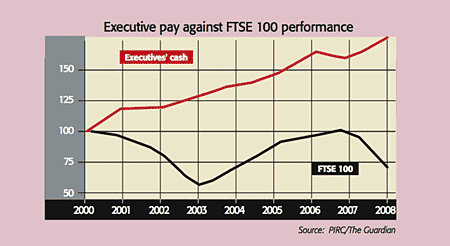Get the latest financial news, insights and expert analysis from our award-winning MoneyWeek team, to help you understand what really matters when it comes to your finances.
You are now subscribed
Your newsletter sign-up was successful
Want to add more newsletters?

Twice daily
MoneyWeek
Get the latest financial news, insights and expert analysis from our award-winning MoneyWeek team, to help you understand what really matters when it comes to your finances.

Four times a week
Look After My Bills
Sign up to our free money-saving newsletter, filled with the latest news and expert advice to help you find the best tips and deals for managing your bills. Start saving today!
"It was hard to escape a twinge of dj vu" last week, says Gillian Tett in the FT. In the boom years, banks were constantly putting assets into semi-detached entities, such as SIVs ('structured investment vehicles'), much like "a household stuffing rubbish into a cellar".
Enter Barclays, which last week announced the sale of $12.3bn of its riskiest assets to a newly created company called Protium Finance, headed by former Barclays staff. It has loaned Protium the money to buy the assets.
Essentially, Barclays is using "financial engineering to transform dodgy assets... on its trading book to a loan on its banking book", says Tracy Corrigan on Telegraph.co.uk. That means that instead of taking a one-time hit to its balance sheet denting its capital it can spread the impact over years.
MoneyWeek
Subscribe to MoneyWeek today and get your first six magazine issues absolutely FREE

Sign up to Money Morning
Don't miss the latest investment and personal finances news, market analysis, plus money-saving tips with our free twice-daily newsletter
Don't miss the latest investment and personal finances news, market analysis, plus money-saving tips with our free twice-daily newsletter
The Barclays deal is a reminder that the carnage in the banking sector isn't over. Most losses on toxic assets have been taken, but plenty more on conventional loans are in the pipeline.
"Bad loans are the next wave" of the financial crisis, says Deutsche Bank's chief executive Josef Ackermann. American consumer loan losses and delinquencies on commercial real-estate loans are rocketing, says John Mauldin on Investorsinsight.com. The latter are 9% delinquent and write-offs could reach $400bn.
One study estimates that 1,000 American banks will go bust in this cycle; so far, around 100 have folded. We have seen the first slide in US bank lending in the post-war era, and "all over the developed world" banks wary of further losses are cutting back on credit, crimping growth.
More than two years in, the credit crunch is far from over.
The big picture: executive pay still outperforms

Sliding share prices have not stopped executives raking it in, says Jill Treanor in The Guardian. Between 2000 and 2008, the FTSE 100 dipped by 30% but the cash paid to executives rose by 80% on average, according to corporate governance consultancy PIRC.
This suggests that the introduction of a "say on pay" a non-binding vote on companies' remuneration reports has had little impact on ensuring that pay is linked more closely to performance.
However, PIRC notes that over the past few years the proportion of pay made up of long-term incentive plans, which should provide a closer link to performance, has gone up.
Get the latest financial news, insights and expert analysis from our award-winning MoneyWeek team, to help you understand what really matters when it comes to your finances.
MoneyWeek is written by a team of experienced and award-winning journalists, plus expert columnists. As well as daily digital news and features, MoneyWeek also publishes a weekly magazine, covering investing and personal finance. From share tips, pensions, gold to practical investment tips - we provide a round-up to help you make money and keep it.
-
 Average UK house price reaches £300,000 for first time, Halifax says
Average UK house price reaches £300,000 for first time, Halifax saysWhile the average house price has topped £300k, regional disparities still remain, Halifax finds.
-
 Barings Emerging Europe trust bounces back from Russia woes
Barings Emerging Europe trust bounces back from Russia woesBarings Emerging Europe trust has added the Middle East and Africa to its mandate, delivering a strong recovery, says Max King

